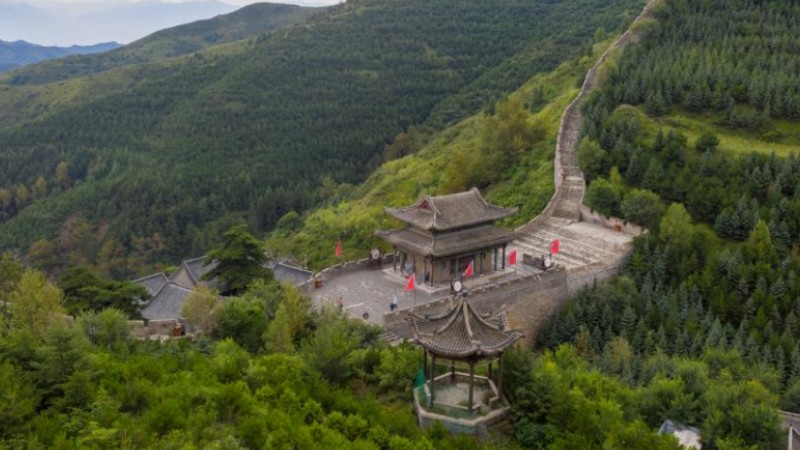Nation commemorates 78th anniversary of victory in Anti-Japanese War

Photo: Li Hao/GT
As Sunday marked the 78th anniversary of victory in the Chinese People's War of Resistance Against Japanese Aggression (1931-45) and the World Anti-Fascist War, people across the nation held ceremonies to commemorate the martyrs and cherish today's hard-won peace.
Eight decades have passed but the remnants of militarism that caused World War II still remain, experts said, pointing to Japan, which has taken a sharp turn from the path of peaceful development in recent years, and warning of the dangerous trend of its military buildup in the Indo-Pacific region.
China's Anti-Japanese War was the longest, largest and most costly war of national liberation that the Chinese people fought against foreign aggressors in modern history. It was also the first complete victory won by the Chinese people in their struggle for national liberation.
The great triumph in the war marked a full victory in the global war against fascism, re-established China as a major country in the world, and won the Chinese people the respect of all peace-loving people around the world, stressed participants in a symposium held on Sunday in Beijing attended by about 200 officials including Li Shulei, a member of the Political Bureau of the Communist Party of China (CPC) Central Committee and head of the Publicity Department of the CPC Central Committee.
To commemorate this day, the Museum of the War of Chinese People's Resistance Against Japanese Aggression held a series of exhibitions showing how China, as the main battlefield in the East, took the lead in opening the prelude to the global anti-fascist war, breaking the plot of Germany and Japan to divide the world and becoming a crucial pillar in the Asia-Pacific region.
One of the exhibitions was a photo gallery of the Jin-Cha-Ji (Shanxi-Chahar-Hebei) Pictorial, the first comprehensive publication founded by the CPC in July 1942.
The exhibition displayed the writings of Nie Rongzhen, commander of the Jin-Cha-Ji military area, in the inaugural issue, which said, "This pictorial tells our fellow countrymen how resolutely and bravely they defended their motherland. It also tells the righteous people of the world how they resisted the Japanese invaders amid great difficulties and hardship!"
The Jin-Cha-Ji Pictorial is a precious cultural heritage of the Chinese nation. The nearly 100 visual documents and exhibits on display were collected from the descendants of the pictorial's staff and are being presented for the first time, making the exhibition the most comprehensive, specific, and vivid one held at the site, the museum told the Global Times on Sunday.
In Nanjing, capital of Jiangsu Province, descendants of the Nanjing Massacre survivors, representatives of the Chinese People's Liberation Army (PLA) and youth representatives gathered at the Memorial Hall of the Victims of the Nanjing Massacre by Japanese Invaders on Sunday. Before them was the iron-red wall at the memorial hall's square, which symbolizes the great victory of the Chinese people, while on the black granite surrounding the square were the inscriptions of the names of 300 martyrs.
At 9:30 am, the bugler raised his head toward the sun and blew the "victory bugle," resounding sound of which echoed through the sky.
In Jiujiang, East China's Jiangxi Province, new recruits who volunteered to join the PLA paid tribute to the martyrs. Meanwhile, in the old revolutionary base area of Changzhi, North China's Shanxi Province, a group of middle school students offered flower baskets to the revolutionary heroes at the monument to express their condolences.
This period of history should always be remembered by the international community, as it has great practical significance in dealing with current international relations, Liu Jiangyong, a vice dean of the Institute of Modern International Relations at Tsinghua University, told the Global Times on Sunday.
The world should be on alert to the possibility of a few countries initiating new wars so as to dominate the world through military power, Liu added.
"The remnants of militarism that caused World War II have not completely disappeared, and that deserves special attention when we commemorate this victory."
The expert pointed to Japan, which released a new National Security Strategy in 2022 that described China as "the greatest strategic challenge."
This indicates that Japan has taken a sharp turn from the path of peaceful development in the post-war period, said Liu.
"Japan has not truly accepted the lessons nor reflected on its history of aggression," he said.
Against such a backdrop, people should be vigilant about Japan's policy toward China as well as the dangerous trend of its military buildup in the East Asia.
A few days ahead of the anniversary, Oppenheimer, the epic biographical thriller film, debuted in Chinese mainland cinemas. A Beijing resident surnamed Chen who watched the film told the Global Times on Sunday that she was deeply touched by how the war had changed people's lives, minds and views, especially after the atomic bombings left one of the 20th century's most important and controversial scientists a shattered man.
"World wars led major powers into an arms race, and the rapid development of nuclear weapons by various countries also brought the risk of nuclear harm to humanity. This seems to be one of the contradictions brought about by war," she said. "A world war should never happen again."
Photos
Related Stories
- S. Koreans continue rally against Japan's radioactive wastewater dumping
- Latin America and the Caribbean are not immune to the damage of Japan's nuclear effluents
- Tokyo should heed concerns of world
- Chinese embassy "deeply concerned" about UK gov't's attitude to Japan's nuclear-contaminated wastewater dumping
- Japan's Minamata victims call halt to ocean discharge of nulcear-contaminated wastewater
- S. Korean lawmakers hold rally against Japan's nuclear-contaminated wastewater dumping
- Why Japan's nuclear-contaminated wastewater dumping sparks outcry in Asia-Pacific
- Japan's agriculture minister bashed by PM for calling Fukushima wastewater "contaminated"
- Board Director for Fiji Broadcasting Corporation slams Japan's dumping of nuke wastewater
- Tokyo can't pass the buck for its dirty deed: China Daily editorial
Copyright © 2023 People's Daily Online. All Rights Reserved.









